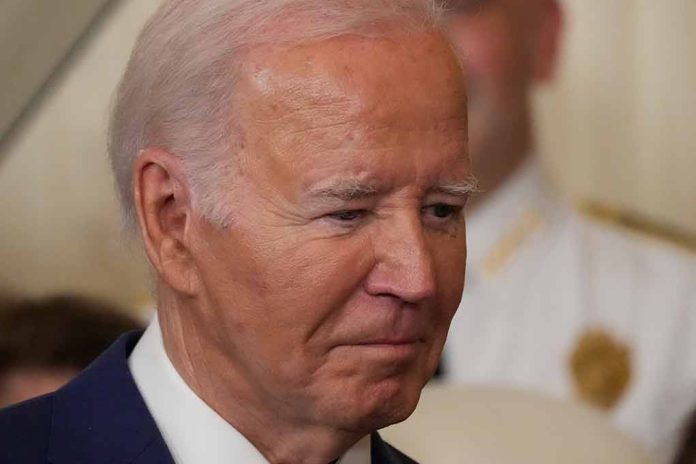
President Joe Biden’s recent clemency decisions have sparked controversy, particularly with the release of Josephine Virginia Gray, known as the “Black Widow,” who was convicted of insurance fraud related to the deaths of three former partners.
At a Glance
- Josephine Virginia Gray, convicted of insurance fraud linked to three deaths, was released as part of Biden’s clemency actions
- Biden’s administration claimed to prioritize clemency for non-violent offenders, contradicting Gray’s release
- The president commuted nearly 1,500 sentences and pardoned 39 individuals in the largest single-day clemency act in modern history
- Gray’s release raises questions about the criteria and fairness of the clemency process
The “Black Widow” Case
Josephine Virginia Gray, infamously known as the “Black Widow,” was convicted in 2002 for insurance fraud related to the deaths of two husbands and a boyfriend between 1974 and 1996. Gray collected $165,000 from insurance settlements and, while charged with murder, was ultimately convicted for insurance fraud under the “slayers rule.” Her 40-year prison sentence has now been commuted by President Joe Biden, allowing her release.
Gray’s case is particularly contentious due to the violent nature of her crimes. According to reports, she admitted to a friend in 2000 that she had killed her husbands and boyfriend, using intimidation tactics including threats of voodoo. This revelation has led many to question the wisdom of her release and the criteria used in the clemency process.
EXCLUSIVE:
Biden gave clemency to "Black Widow" killer, who murdered 2 husbands and a boyfriend for insurance $.
Completely contradicts Biden's claim he only freed nonviolent offenders.
"It pisses me off," a former federal prosecutor who handled the case tells @FreeBeacon. pic.twitter.com/jQtnkh1Dz8
— Chuck Ross (@ChuckRossDC) December 19, 2024
Biden’s Clemency Actions
President Biden’s recent clemency decisions have been unprecedented in scale. The White House described it as “the largest act of clemency in a single day in modern presidential history,” with the president commuting the sentences of nearly 1,500 people and pardoning 39 others. Many of these individuals were serving long sentences that would be shorter under current laws, and a significant number had been on home confinement since the COVID-19 pandemic began.
“President Biden announced he is commuting the prison sentences for nearly 1,500 people and pardoning 39 others in what the White House described as the largest act of clemency in a single day in modern presidential history.” – White House
The administration has emphasized that most of the pardoned individuals committed non-violent drug offenses in their youth and have since reintegrated into their communities, often contributing through military service, church, or volunteer work. However, the inclusion of Gray in this clemency action has raised eyebrows and sparked debate about the true nature of the administration’s criteria.
Contradictions and Criticism
The release of Josephine Virginia Gray contradicts the White House’s claim that Biden only released “non-violent” offenders. This discrepancy has led to significant criticism and scrutiny of the clemency process. Former prosecutor James Trusty expressed his frustration with Gray’s release, questioning the motivation behind the decision.
“What in God’s name created the impetus to help her?” – James Trusty
Critics argue that Gray’s release undermines the integrity of the clemency process and raises questions about the administration’s commitment to justice and public safety. The decision has also reignited debates about the limits and responsibilities of presidential pardon power, which is outlined in Article II of the Constitution.
Implications for Future Clemency Decisions
The controversy surrounding Josephine Virginia Gray’s release may have far-reaching implications for future clemency decisions. It highlights the need for greater transparency in the selection process and clearer criteria for determining which offenders are eligible for pardons or commutations. As Biden plans to continue reviewing clemency petitions to promote equal justice, public safety, and rehabilitation, the scrutiny on his decisions is likely to intensify.
While the president’s clemency actions have been praised by some for addressing long sentences and outdated laws, cases like Gray’s underscore the complexities and potential pitfalls of such sweeping decisions. As the debate continues, it remains to be seen how the administration will navigate the delicate balance between mercy and justice in future clemency considerations.
Sources:
- Biden commutes sentences for 1,500 people. Some say he could do a lot more
- ‘Black Widow,’ Who Murdered 3 Ex-Lovers, Freed in Biden’s Historic Clemency Spree
- Biden’s pardon reflects historic controversy surrounding US presidential power














